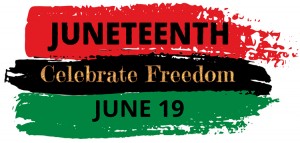Juneteenth
June 20, 2017
Yesterday, June 19, was Juneteenth, a festival held in many African American and other communities to commemorate the end of slavery in the United States. The name of the festival refers to the date, June 19—the day the last slaves were freed in the southern state of Texas in 1865. Juneteenth festivities often include plays and storytelling, parades, prayer services, and family reunions. Some communities hold longer Juneteenth festivals spanning several days as a celebration of civil rights and freedom. Juneteenth has been a legal holiday in Texas since 1980.
Juneteenth originated in Texas at the end of the American Civil War (1861-1865). In 1863, President Abraham Lincoln issued the Emancipation Proclamation, which declared freedom for the slaves in Confederate states in rebellion against the Union. However, many slave owners in Texas suppressed information about the emancipation even after the war ended in April 1865. On June 19, 1865, Gordon Granger, a Union general, entered Galveston, Texas, and ordered all slaves in the state to be freed. About 250,000 people, among the last slaves remaining in the United States, were freed.

People attend a Juneteenth parade in the town of Bastrop, near Austin, Texas. Juneteenth celebrates the day, June 19, 1865, when Union soldiers landed in Galveston, Texas, announcing the end of slavery and the Civil War. Credit: © Bob Daemmrich, Alamy Images
Juneteenth celebrations were held only in Texas and a few communities in other states in the southern United States in the years following the Civil War. African Americans carried the celebration with them, however, as they migrated to other regions of the country. Today, Juneteenth festivals are popular celebrations of freedom and African American culture throughout the country. Special Juneteenth events are held each year at numerous state museums as well as at the Smithsonian National Museum of African American History and Culture in Washington, D.C.



